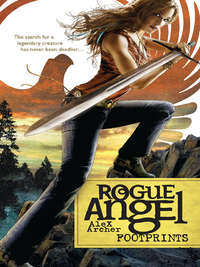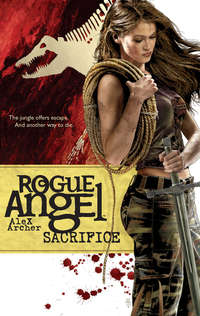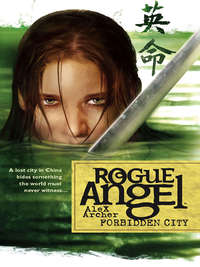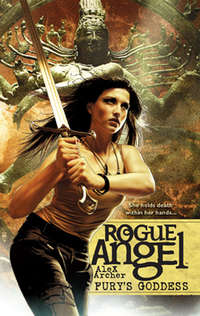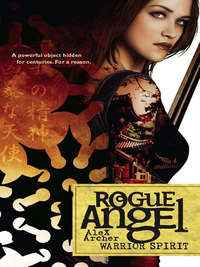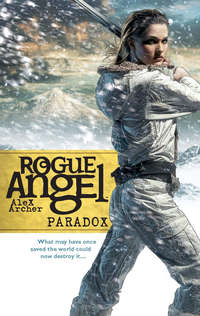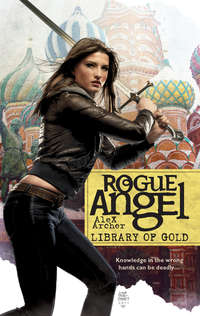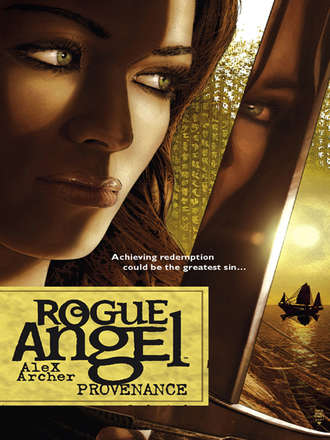
Полная версия
Provenance

Provenance
Rogue Angel™
Alex Archer

www.mirabooks.co.uk
Special thanks and acknowledgment to Victor Milán for his contribution to this work.
Contents
Chapter 1
Chapter 2
Chapter 3
Chapter 4
Chapter 5
Chapter 6
Chapter 7
Chapter 8
Chapter 9
Chapter 10
Chapter 11
Chapter 12
Chapter 13
Chapter 14
Chapter 15
Chapter 16
Chapter 17
Chapter 18
Chapter 19
Chapter 20
Chapter 21
Chapter 22
Chapter 23
Chapter 24
Chapter 25
Chapter 26
Chapter 27
Chapter 28
Chapter 29
Chapter 30
Chapter 31
1
A burst of automatic rifle fire in the grand ballroom shattered the band’s bright dance music like a crowbar smashing glass figurines from a shelf.
People screamed. Men in tails and white ties and women in elegant evening gowns threw themselves to the floor or clung to each other and trembled. Heads turned to stare at the half-dozen black-hooded men in loose green-and-black camouflage-pattern clothing who had burst in like wolves among pheasants.
And here I am practically naked in this ridiculous dress, Annja Creed thought, arched over backward with her hair almost brushing the elegant blue-and-gold carpet and only Garin Braden’s strong right arm keeping her from falling.
SHE HAD THOUGHT the evening had started inauspiciously.
“How good of you to join me,” Garin murmured when she presented herself at his table. Actually, she was presented by a bowing and scraping steward who acted as if he were giving a supermodel as a gift to a maharajah. Except a maharajah would probably not have received quite such deferential treatment.
Annja felt eyes sticking to her like clammy clumps of seaweed. She felt exposed in the clinging sheath of flame-colored silk he had picked out for her. Her long chestnut hair had been swirled atop her head by the cruise ship’s expert staff of hairdressers. She suspected it made her look as if she had a soft-swirl ice-cream cone for a head. Around her slender neck she wore a delicate gold chain with an emerald pendant that Garin assured her would bring out the green highlights in her amber-green eyes. She knew it was exquisitely tasteful, just too small to be gaudy. But she could practically feel the weight of the money it had cost. It felt like an anchor.
“As if I had a choice,” she said snidely as she allowed herself to be seated.
Garin laughed a rich baritone laugh. He was a charismatic devil, she had to give him that. And devilishly handsome. The catch was the consistent way devil kept creeping into her thoughts about him.
“There’s always a choice, my dear,” he said. “That is one thing life has taught me in no uncertain terms.”
As always Annja felt conflicted about Garin, as she smiled and accepted the menu from the headwaiter. In his immaculate tuxedo with the star-sapphire stickpin, his black hair and goatee and dancing black-diamond eyes, Garin was admired by every woman in the room. He was charming, breathtakingly well-read and witty. He was vigorous, and as CEO and majority shareholder of the monster oil company EuroPetro he was, officially, richer than God. He was what most women in her position would consider one hell of a catch.
But hell was the operative word. That was the catch.
First of all, Annja had sworn off having affairs with men significantly older than she was. Not that he looked over the limit. Annja was in her mid-twenties. Garin appeared to be in his early thirties. But his real age belied that appearance—by centuries.
And then, of course, there was the fact that, while he sometimes helped her—indeed, she was paying off one of those debts at that moment—he also had the unfortunate habit of trying, at entirely unpredictable intervals, to kill her.
Around them people chatted and drank wine from immaculate crystal and ate five-star food. The cruise ship Ocean Venture was the most modern and luxurious ocean liner yet built.
“I can’t believe I let you blackmail me to serve as arm candy for some business negotiation,” she said.
“Blackmail is an ugly word,” Garin murmured over the top of his menu. “Besides, I believe extortion is more correct under the circumstances.”
She glared at him through slitted eyes.
“You really must try the Pinot Noir. A splendid vintage. In any event, if you wish to keep your scruples inviolate, you can always choose to believe that you are here of your own free will. It’s true, of course.”
He held the crystal goblet up, where the light from the chandelier struck bloody highlights through the wine. “See? As I’ve told you, my dear. There’s always a choice.”
She winced.
He ordered for them. She didn’t mind. It was the role he was playing. She was secure enough in her own independence not to feel threatened—least of all by him.
She did have something he wanted. And she did keep it coyly and carefully hidden from public view. But it wasn’t what most people would think.
It was a complicated dance they danced.
The food was excellent but Annja ate mechanically. Distracted by circumstances, she scarcely noticed what she consumed. Growing up in an orphanage in New Orleans’ French Quarter, she had learned not to be picky about what she ate. As she spent more time on the Crescent City streets she had learned to appreciate good food. Subsequently, as a graduate student and then archaeologist on innumerable digs, and in the last few years trotting the globe as staff talking head and resident voice of reason on Chasing History’s Monsters, she had learned to be quite adventurous about what she ate.
She was preoccupied, on the evening of the first full day at sea in the Caribbean.
“So why do you have me here?” she asked.
Garin smiled. “Reasons of my own.”
The reason she was there was that he had called in a favor. A big one. A save-your-life favor—not to mention the life of an innocent girl who’d depended on her.
Of course in the process of doing her that favor he had increased his wealth and influence almost exponentially. To his mind that failed to diminish the moral obligation one iota. What was worse was, he knew full well it didn’t in her mind, either.
At some point in the future, when she wasn’t still miffed about having her arm twisted, she would have to admit to herself there were worse fates than getting a free ocean cruise with a movie-star-handsome man who happened to be one of the world’s richest. If she was a captive bird her cage was very well gilded by any standards. And her captivity, to call it that, would last no more than the four days of the cruise. But her fiercely independent nature bridled at it anyway.
“Come on,” she said, spearing a piece of asparagus. “You owe me a better explanation than that.”
He shrugged a broad, tuxedoed shoulder. “Perhaps you’re right, Annja dear. I have no wish to torment you, after all. I am not a cruel man, you know—I worked that out of my system long ago.”
She tried not to shudder, and tried harder not to envision just what he meant.
“Although I’m maintaining a low profile on this voyage,” he said, “and the world at large still does not know my face—an expensive status to maintain, but well worth the investment—I have a certain image to project to those with whom I’m carrying out a certain, most delicate negotiation.”
His accent was vaguely and indeterminately European. She suspected it was an affectation. He no doubt could speak English better than she could. He’d had long enough to practice.
Nonetheless it did contribute to making him devastatingly sexy. Curse him anyway, she thought. This could turn out to be a very long voyage.
“Aren’t you concerned about doing that under the noses of the Venezuelans?” she asked. The Ocean Venture had just steamed past Aruba in the Netherlands Antilles, and was scheduled to make landfall at Willemstad on the island of Curaçao the next morning to allow sightseeing and, of course, a spree of shopping. Venezuela’s north coast lay less than a hundred miles to the south.
“How do you know those aren’t the ones I’m negotiating with? Their oil holdings might prove of interest to EuroPetro. They certainly do to the Chinese.”
She looked at him hard. “Am I just arm candy?” she asked. She shook her head in almost reflex negation. “You could have your pick of supermodels or Hollywood stars. If you crooked one finger, Nicole Kidman would kick Keith Urban back into rehab and fly at you like somebody’s wristwatch to the inside of an MRI machine.”
He laughed with a gusto that made heads turn. He paid no mind. He did few things by halves. “You’ve a gift for unexpected expression,” he said. “Indeed, you’ve a positive gift for the unexpected. Is it not enough to know that I savor that? Because I do. Not to mention your beauty, which to my sorrow you constantly denigrate, and which possesses, to these jaded old eyes, a freshness few celebrities—especially the flavors of the week—can match.”
Annja snorted in a most unladylike way. “Flattery,” she sputtered.
He scowled and she recoiled slightly. She feared a lot of things and a lot of people—she had seen and experienced far too much not to—but she was intimidated by no one. He came close, though.
“Please, my dear,” he said, softening a degree or so, “never say such a thing again. I never flatter.” Then that grin, youthful and ageless, returned. “It implies I need to.”
“Point taken.” Finding her plate empty, she set down her fork, propped her elbows to either side, laced her fingers in their flame-colored long gloves and rested her chin on them. “Now, give. Why is it so important to have me along?”
“Perhaps I feel the need of additional security,” he said, with a roguish twinkle in his eye. Well, even more than usual. “You make a most exemplary bodyguard, as well as a—shall we say—disarmingly lovely one?”
She snorted again. “I don’t want to set off that touchy Renaissance pride again,” she said—she was something of an authority on the Renaissance, it being her period of professional specialization as an archaeologist and historian. “But that seems rather hard to believe. You can afford to travel with a phalanx of top security men. And you do—I’ve spotted a few of them on the boat. Immaculately dressed bald guys with wires in their ears.”
“Ship,” Garin corrected automatically. “Without meaning to denigrate your own falcon keenness of perception, don’t you think potential evil-wishers can do at least as well spotting such men? Whereas you are an extraordinarily gifted amateur, some of them are lifelong professionals at the craft.”
“Hel-lo,” she said quietly, “you’re immortal.”
He chuckled. “Being immortal doesn’t necessarily mean I can’t die,” he said. “It just means I haven’t.”
He made an easy gesture with one hand. “I am extraordinarily tough to kill, I grant. But there are certain fates that might make me wish I could die. What if I was trapped at the bottom of the sea? So that I was perpetually drowning, but couldn’t quite die? That would be like hell, would it not? So you see, I’ve plenty to fear. And of course, there is always my concern, now that you’ve claimed the sword, that my gift—the one that old rake Roux perversely prefers to consider a curse—of immortality might evaporate.”
Annja’s blood ran cold. She could never forget that Garin would—if he could—wrest the mystic sword of Joan of Arc away from her and break it to pieces again, as had the English soldiers who had captured St. Joan so many centuries before.
“Fear not, fair lady,” Garin said, eyes dancing as he finished his wine. “So long as I continue to wake up each morning feeling hale and whole—you can continue to wake up in the mornings. Shall we dance?”
“You’re a bastard,” she told him as he held her chair and helped her to her feet.
“Born that way,” he acknowledged, “although I like to think I’ve earned the title on my own merits, over the years.”
When the band, perched on its podium to one side of the great ballroom, struck up a tango, Annja thought for sure the evening couldn’t possibly get any worse.
“I don’t know how to tango,” she snarled in Garin’s ear.
“You’ll be fine,” he said. “You’re a natural athlete. And a trained martial artist. Remember your taijiquan balance training.”
“I don’t do taijiquan in heels,” she said. She knew now why they called them stilettos—they were like daggers stabbing her feet at every step. As much experience as she had wearing heels—very little—she walked in them with all the grace of a drunken baby duck. Whereas she danced in the high spike heels, she thought, like a water buffalo on skates. But a tango—“I’ll break an ankle!”
He laughed softly. “Follow my lead,” he said. “It’s worked splendidly for you so far.”
She struggled to keep her irritation from showing on her face. Her gown was backless, and its bodice consisted of what she tried not to think of as bunny ears from just south of her navel upward, diminishing to bitty strings tied behind her neck. It was held in place either by some kind of surface tension, like a bubble, or through magic. And she didn’t believe in magic.
She’d seen the tango sequences in True Lies. She secretly identified with Jamie Lee Curtis, a sort of standard-bearer for gawky women who could still be darned sexy. But once Garin started flinging her around she feared it would be mere seconds before her boobs came flying out of the dress like startled pigeons.
“Trust me,” Garin said with a wicked grin.
“Yeah,” she whispered furiously. “It’s not like you’ve tried to kill me.”
“Not recently,” he said. “And most assuredly not here.”
The preliminary violin strains died away. She felt his hand burning at the small of her bare back as if heated in a forge.
The tango began in earnest. He leaned forward. In response she leaned back, bent over his strong grasp. She felt her breasts ride up her rib cage and thought, This is not good.
That was when the terrorists barged in and fired a burst into the ceiling.
2
“Nobody move!” a black-hooded man shouted in Spanish-accented English. “We have commandeered this vessel in the name of the People’s Revolution!”
“How tedious,” Garin murmured, his face inches from hers. “It seems we’re being hijacked.”
“I’m almost relieved,” Annja murmured. Her heartbeat, already accelerated, spiked. But she wasn’t in any danger of losing her presence of mind over a little full-auto gunfire, even though it hurt her ears in these close confines.
At least it wasn’t aimed at her.
With deliberation Garin straightened his back. He brought Annja upright as if she weighed nothing.
“You think they’re trying to kidnap you?” she asked softly.
He frowned slightly. “I think not. Trust me, I’d sense their intention.”
“How?”
He smiled. “Long experience. This is something else.”
He let go of her hand. The other stayed at the small of her back. She found it strangely reassuring. “Now let’s play along like good little lambs,” he said.
She knew how he thought. “Until…?”
His smile widened. It made her think of a lean black wolf contemplating a staked lamb. “Until it’s time not to, of course.”
More armed men crowded into the room. They carried what Annja recognized as Kalashnikov AKMs, some with folding stocks, some with fixed wooden stocks. She had learned they were generic weapons for terrorists—or people who wanted to pose as terrorists. Something about the men struck her false. Maybe they’re just pirates, she thought.
She looked to Garin. He was looking elsewhere. She saw him give his head a barely visible shake and realized he was telling one of his security men to stand down. For the moment.
At least a score of men in black ski masks had bustled in to the ballroom. They broke up in to several groups. One rousted the musicians off the platform. In different circumstances it might have been funny to see the men and women in their penguin suits scurry off clutching their instruments to their breasts. As the gunmen on the platform covered the crowd, other knots of two, three and four began to move among the dancers, cutting them into groups of a dozen or so like cattle-herding dogs.
One of the men on the dais grabbed a microphone from its stand. “You are now the People’s prisoners of war,” he declared. “If you follow instructions you will be treated properly. Do not try to be heroes. If you resist you will be considered an unlawful combatant, and will be killed.”
Garin’s expression hardened. “Another unfortunate legal precedent we have to thank your government for,” he murmured.
“Why are they separating us?” Annja asked under her breath. “Wouldn’t it be easier for them to keep control if they kept us together?”
“Dividing the hostages into groups and dispersing them throughout the ship makes it harder for counterterror teams to effect a rescue,” he said.
“Oh.” Annja glanced down at her feet. She really wanted to ditch the heels. She always hated it in the movies when a heroine tried to run—or do anything more demanding than a runway turn—in heels. She’d hate trying to do anything herself if the crunch came down, encumbered with what she thought of as torture devices.
But the lightweight gold pumps had straps that crisscrossed past her slim ankles halfway to her knees. She knew they looked sexy. But they also meant she had no chance of kicking off the shoes quickly. She would have to bend over—which might cause misunderstanding among their captors. And Annja made it a principle never to court misunderstanding with people toting automatic weapons.
Two men thrust themselves between Annja and Garin, jabbing at them as if their heavy Russian-made assault rifles were pitchforks. They might as well have been, for the alacrity they elicited from people shying away from their menacing black muzzles.
Annja found herself amongst a dozen—ten passengers and two stewards, the latter a man and a woman, both with painfully young faces sheened with nervous sweat. Of the group, six were elderly and four Annja’s age or a little older, which seemed a representative sampling of the passengers.
The captives were being split up without regard to who was with whom. One thirtyish man with a blond crewcut tried to stay with a female partner who was being prodded from his side. A terrorist clipped him in the face with the butt of his rifle.
Annja winced. She knew the AKM was nearly nine pounds of hardwood and stamped steel, with a steel plate capping the butt. The man went down as if shot, although a moment later he was being helped to his feet by a fellow passenger and a steward whose crisp white jacket was never going to be the same with all the blood pouring on it from the man’s smashed nose.
A pair of terrorists herded Annja’s group to the galleys. One guard preceded them, kicking open the double doors. She caught a glimpse of Garin in a different group going out a side entrance. Then she was in the humid gangway, all white and stainless steel, redolent of cooking food and dishwashing steam. Stewards and chefs in their puffy white hats emerged from side doors, to vanish like rabbits down holes when the terrorists barked at them and pointed their rifles.
As their captors, shouting, herded them down the gangway, figures from the cruise line’s brochures played through Annja’s mind as she tried to encompass the tactical situation. Ocean liners always reminded Annja of skyscrapers toppled onto their sides into the ocean. The Ocean Venture’s vital statistics did little to belie that image. Over one thousand feet long and one hundred feet wide, more than two hundred feet from keel to funnel, grossing over 125,000 tons. With fifteen decks she accommodated two thousand passengers and over one thousand crew. She contained gyms, two swimming pools and even a water park.
It really was a horizontal, ocean-going skyscraper, plain and simple.
How many men do they have? Annja wondered. It would take a huge force of highly trained special-warfare operators to really secure something this huge with so many people aboard. She was no professional herself but she was still sure it would tax the resources of a full U.S. Navy SEAL team to do so.
No way did the terrorists—or pirates—have that many men aboard. No way did they have that kind of training and discipline. That was just practical reality, she knew.
So they would try to secure important locations, such as the bridge and engine rooms—and they would grab some hostages. They probably preferred the richest of the passengers—who happened to be attending the fancy-dress ball. She presumed they’d ordered everybody else to go to their rooms and stay there. They’d enforce the order by sending random patrols of men with guns to threaten anybody who poked their heads out.
As Annja’s group proceeded, the doors that weren’t opened by curious staff were yanked or kicked open by the terrorist in the lead. He seemed to be looking for something. Suddenly he dived into a room. A pair of white-clad staff erupted out like flushed pigeons and raced away down the hall. Apparently the men had all the hostages they felt they needed.
The lead terrorist emerged again. He had long kinky black hair flowing out the bottom of his ski mask. His eyes, visible through the holes, were dark. They showed a lot of white, like a frightened horse’s. Annja didn’t think that was a hopeful sign. A hyper-adrenalized state, a finger in the trigger guard, an automatic weapon with the safety off and crowded quarters was a potentially explosive combo.
“In here!” he shouted, gesturing with his rifle into what Annja could see was a storeroom lined with shelves of fat, institutional-sized cans.
Annja strode forward, wobbling only slightly. Sharp pains shot up her calves. She held her head high and her face impassive.
From somewhere distant came the thud of a single gunshot.
GARIN BRADEN smiled and nodded encouragingly to the dowager with the blue-white hair and the gaudy string of pearls. His group had three gunmen herding nine prisoners, including a little girl of perhaps nine. From their stature and quick motions Garin surmised, not surprisingly, all three were young. Two carried AKMs. The third, who seemed to be a sort of officer, carried a handgun, a Beretta or the nearly identical Brazilian Taurus. They were highly excited. Perhaps more than even the circumstances called for. That concerned him.
Something about these self-proclaimed terrorists—or People’s Revolutionaries—struck him as phony.
He took no more interest in the conflicts of human ideologies for their own sake than a normal adult in the battles between the red ants and the black. As with cruelty, it had taken him what he now frankly regarded as an unseemly amount of time to outgrow an adolescent interest in that sort of thing. But outgrow it he had, now centuries past.
He took the same sort of interest in politics and its attendant shooting conflicts that a canny sailor or pilot took in the weather—with a wary regard for potentially lethal storms. Unlike airmen or seamen, though, he also sometimes kept a weather eye peeled for potential profits from those situations.
He was particularly suspicious about Spanish-accented revolutionaries cropping up right off the coast of loudly socialistic Venezuela. Indeed, for self-proclaimed revolutionaries to pull so drastic a stunt within air-strike range of Venezuela smacked of an attempt to discredit or embarrass the government—or even a false-flag attempt to justify violent U.S. retaliation.


